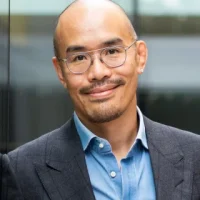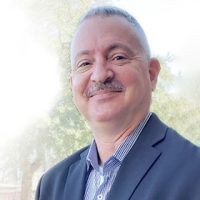Expert Panel:

Prof. Constantine Tam
Head of Lymphoma Service, Alfred Health

Jeff Folloder, Moderator and CLL patient advocate
Our recent CLL Global Research Foundation Town Hall featured CLL Global President, Dr. William Wierda, and Dr. Constantine Tam from Monash University in Melbourne. CLL patient advocate Jeff Folloder moderated the event. Watch the full webinar.
Transcript
Jeff Folloder:
Dr. Tam, let’s turn to you to hear your thoughts on the conference.
Prof. Constantine Tam:
So, Dr. Wierda has really summarized the highlights of the conference. I just wanted to highlight, to get different angle, and just talk about – expand the way Dr. Wierda talked about the BTK degrader, and why that’s such an important treatment.
So, this is a summary situation of a new area, which is basically BTK mutations. So, we know that patients who take the traditional BTK inhibitors – such as ibrutinib, zanubrutinib, or acalabrutinib – they respond well, but ultimately, they develop resistance. Usually due to a mutation where the drug binds. And that’s where the new drugs like pirtobrutinib comes in, because it binds to different points. And it gives us a second opportunity to treat using the BTK pathway.
Now, we’ve now realized that while the cancer is quite clever, and while we can block the traditional points where the mutation occurs, but with the new drugs like pirtobrutinib, we’re now getting multiple mutations in new areas. So, the BTK degraders are a really exciting new class of drugs, because the way they work is they actually destroy the BTK protein. So, where the cancer has a chance to mutate the protein to basically shake off our traditional drugs – including acalabrutinib and including pirtobrutinib – the degraders actually destroy the entire protein.
So, we think that this is exciting for two reasons. Firstly, it gives us a third opportunity to treat BTK. So, a patient can have now potentially three goals at treating the BTK pathway, and get an extended period of benefits from that treatment. And secondly, it also gives us a way to hopefully treat the BTK pathway with a reduced risk of resistance.
So, this is an active area of research, both worldwide. As Dr. Wierda mentioned, there are now two lead compounds in this area. And what’s really exciting to me is that it worked when traditional BTK inhibitors have stopped working. So, they’re clearly effective in patients with resistance.
And also, the fact that the side effects are in fact very mild. So, the side effects are exactly as expected for the traditional BTK drugs, showing that we can actually destroy the entire protein and get cancer control, but not induce any new side effects. So, that’s a really exciting area for us.
Jeff Folloder:
Fantastic. This is exciting stuff. There are options for when even the new treatments are failing. We’re exploring new things. These are great overviews. I appreciate that very much. Dr. Tam, are there areas of CLL research that you in particular are involved in? What would you like to share about that ongoing work?
Prof. Constantine Tam:
So, we have been very involved in the study that Dr. Wierda – well, actually, we are involved in the whole spectrum of new therapies for CLL. Including the next generation of BTK inhibitors, the combinations with sonrotoclax, as well as epcoritamab and CAR T cells. So, we’re working on exactly the same areas as Dr. Wierda’s group. And we’re aligned because these are the most exciting, the most effective treatments that we have. So, we align pretty much our research direction very similar to that of our Houston colleagues. And it’s probably the one thing that we have a special interest in is actually defining, in great detail, the mutational profile of our patients. So, we’ve had a tradition of looking very carefully at our patient’s samples to try and find reasons for why they don’t respond to drugs anymore.
And our group had been very fortunate in making discoveries about what the mutation that causes resistance to venetoclax. We’re able to identify the new mutation that affects zanubrutinib. And we’re now working on some of the mutations that affect our newest generation of drugs, including degraded. So, once we workout, how cancer has managed to evade our treatments, we can then develop a new therapy for it.
So, that’s all I wrote. And I think it really emphasizes the global nature of Cll and advancement. That we can be on different ends of the world, and yet, we’re providing best therapies to our patients, and we are complementing our research step by step.

